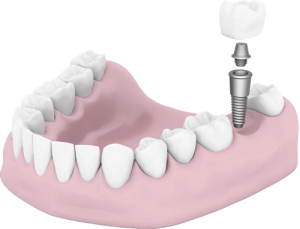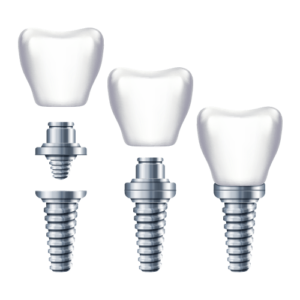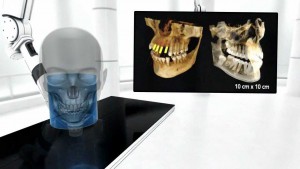In the last few decades, there have been several major breakthroughs in restorative dentistry, and the dental implant is definitely one of them. Dental implants offer patients who are missing a single tooth or multiple teeth a more advanced alternative to dentures. They can significantly enhance the appearance of your smile, and even your overall livelihood. Dr. Jimmy Wu, our experienced La Mesa dentist here at Sutra Dental Spa, offers state-of-the-art dental implant restorations that can restore your smile with beautiful results.
- What are Dental Implants?
- Benefits of Dental Implants
- Dental Implants Candidates
- Dental Implants vs. Dentures
- Guided Dental Implant Surgery
- Dental Implants Procedure
- Dental Implants Recovery
- Do Dental Implants Hurt?
- Dental Implants Results
- How Long Do Dental Implants Last?
- Dental Implants Risks
- Dental Implants Alternatives
- Dental Implants Cost
- Choosing the Best Implant Dentist
- Additional Dental Implants FAQs
What are Dental Implants?
Dental implants are advanced missing teeth replacement options designed to mimic both the form and function of natural teeth, actually becoming a permanent part of the mouth. The implant itself is made of a thin, durable titanium post. Inserted with extreme precision into the gum, the implant is anchored to the jawbone, where it should fuse to the bone and function in ways similar to a natural tooth root. A custom dental crown serves as the finishing touch for the dental implant to create a final result that can yield both aesthetic and functional advantages.
What Are the Benefits of Dental Implants?
 Dental implants offer numerous advantages over traditional dentures, including:
Dental implants offer numerous advantages over traditional dentures, including:
- Replacement of missing teeth with permanent results
- No movement or slippage along the gums
- Improvement in chewing, biting, and speaking
- They typically look and feel like natural teeth
- Aside from normal brushing and flossing, no additional maintenance is required
Am I a Candidate for Dental Implants?
Good candidates for dental implants are typically individuals who have a single missing tooth or multiple missing teeth and those who have adequate jawbone density to accommodate the implant. Candidates must also be free of certain medical conditions and not currently undergoing chemotherapy or radiation treatment. Dr. Wu will perform a comprehensive oral evaluation and determine whether this treatment is a good option for your needs.
What are the Advantages of Dental Implants Over Traditional Dentures?
Dental implants are replacements for missing teeth that are designed to look, feel, and function like natural teeth. While traditional dentures can be effective for many patients, ill-fitting dentures can slip and move along the gumline. They also typically require messy adhesives and dental pastes, as well as daily maintenance that can become inconvenient. Dental implants are essentially artificial tooth roots that fuse to the jawbone, mimicking natural teeth. With 3-D Cone Beam Imaging technology, guided dental implant surgery, and advanced restorations available at our practice, dental implants can ultimately be virtually indistinguishable from your natural teeth and last for decades with the proper care.
Guided Dental Implant Surgery and 3D Cone Beam Imaging
One of the most important steps in the dental implant treatment process is the initial planning stage. In order for the results to be virtually indistinguishable from the look, feel, and function of a natural tooth, the implant must be placed with incredible precision and accuracy. Dr. Wu utilizes some of the most advanced technology available to provide surgically guided dental implant procedures designed to give you the best possible results.
Guided dental implant surgery begins with an intricate scan of your oral anatomy produced by our state-of-the-art 3D Cone Beam imaging system. With this extraordinarily detailed image of your teeth, gums, and bone structure, Dr. Wu can create a precise plan for the ultimate placement of the implant or implants. Cone Beam imaging and guided dental implant surgery helps Dr. Wu increase accuracy, reduce the risk of complications, and more correctly predict the overall results. Guided implant surgery can also reduce treatment time and provide greater assurance that the implants will fit naturally and comfortably. In addition, the x-ray technology in Cone Beam 3D imaging exposes patients to much less radiation when compared with more traditional x-ray techniques.
While guided dental implant surgery is utilized for both single-tooth and multiple-teeth replacement procedures, it is particularly beneficial for patients needing a single implant placed between two natural teeth. The advanced imaging software combined with the skills of our dentist make it possible to place the implant in the most precise location, leading to the most natural fit.
What Does the Dental Implant Procedure Involve?
 The first part of the dental implant procedure involves a consultation to determine your candidacy. Patients who have adequate jawbone density in the area of missing teeth are often good candidates for this procedure; however, there are a number of factors to be considered. In some cases, implant-supported dentures can serve as an alternative. Dr. Wu will perform a comprehensive oral evaluation and talk with you about your options. Once you have been determined to be a candidate for dental implants, Dr. Wu will take detailed x-rays of your oral anatomy with our advanced Cone Beam 3D Imaging system. These high-resolution images will give Dr. Wu a precise map of your oral structures, helping him to design and place the implant in the area that should yield the most comfortable and natural fit possible.
The first part of the dental implant procedure involves a consultation to determine your candidacy. Patients who have adequate jawbone density in the area of missing teeth are often good candidates for this procedure; however, there are a number of factors to be considered. In some cases, implant-supported dentures can serve as an alternative. Dr. Wu will perform a comprehensive oral evaluation and talk with you about your options. Once you have been determined to be a candidate for dental implants, Dr. Wu will take detailed x-rays of your oral anatomy with our advanced Cone Beam 3D Imaging system. These high-resolution images will give Dr. Wu a precise map of your oral structures, helping him to design and place the implant in the area that should yield the most comfortable and natural fit possible.
Once your treatment plan has been created, Dr. Wu will place the dental implant. Composed of a thin titanium post, the implant will be anchored to the jawbone in the area of the missing tooth. Over the next few months, the implant should fuse to the bone, becoming a permanent part of the mouth. Once fusion, or osseointegration, has occurred, Dr. Wu will affix a custom-designed dental crown over the post. The crown will be color-tinted to match surrounding teeth. Once Dr. Wu gives the crown a final polish, the treatment process is complete. Your implant should look and feel incredibly natural – in fact, you may have a difficult time distinguishing it from your original teeth!
What About Recovery From the Dental Implant Procedure?
The recovery process from dental implants is different for everyone; however, most patients experience some swelling and minor bleeding in the treatment area following the implantation process. It is very important to continue to brush and floss after the implants have been placed in order to reduce the chance of infection and a failed implant procedure. Discomfort during recovery is typically minimal and can be managed with medication.
Do Dental Implants Hurt?
The dental implant treatment process typically involves very little pain and can often be performed using a simple local anesthetic. Our practice also offers sedation dentistry options for patients who experience severe levels of dental anxiety.
How Natural Will Dental Implants Look and Feel?
All dental implant procedures from Dr. Wu are customized to provide the best possible fit and appearance. The implants are carefully placed in the treatment area and the crown is meticulously designed to create a look, feel, and function that is as natural as your original teeth.
How Long Do Dental Implants Last?
Dental implants are intrinsically designed for durability and longevity. With the proper care, good oral hygiene regimens, and consistent dental check-ups, dental implants should last many, many years into the future.
Are Dental Implants Safe?
 Dental implant procedures involve oral surgery, and all surgical treatments carry some degree of risk. With that in mind, Dr. Wu takes every precaution to make this procedure as safe as possible, including his utilization of advanced planning and imaging technology to minimize the potential for complications. Dr. Wu is highly experienced with dental implant treatments and will provide you with detailed information regarding the procedure itself and instructions for post-operative care that can reduce the chance of implant failure, infection, or other problems.
Dental implant procedures involve oral surgery, and all surgical treatments carry some degree of risk. With that in mind, Dr. Wu takes every precaution to make this procedure as safe as possible, including his utilization of advanced planning and imaging technology to minimize the potential for complications. Dr. Wu is highly experienced with dental implant treatments and will provide you with detailed information regarding the procedure itself and instructions for post-operative care that can reduce the chance of implant failure, infection, or other problems.
Alternatives to Dental Implants
For some patients, full dental implant procedures may not be the most ideal option to meet their needs. Fortunately, for those who are not the best candidates or for individuals who simply would like to explore other missing teeth replacement options, there are a number of alternatives to dental implants that can achieve successful results. Treatments such as implant-supported dentures, which utilize only a select number of strategically placed implants combined with a custom denture, can often be useful for patients who are replacing multiple teeth or full rows of teeth. Options such as dental bridges can be ideal for replacement of one or more missing teeth that are adjacent to each other. These potential alternatives are designed to help patients restore their teeth with outcomes that both look and feel natural.
What Do Dental Implants Cost?
The total price of dental implants is typically different for each patient. General estimates can range from $1000 to $4000 per implant; however, since dental implant procedures are customized, the cost can fluctuate depending on a variety of factors. These factors include:
- The overall complexity of the procedure
- The number of dental implants necessary to meet your needs
- Whether other procedures, such as sedation dentistry or periodontal care, are also part of the treatment plan
- The geographic location of the practice
- Dental materials utilized
Once your initial oral evaluation is complete and a treatment plan has been created, a member of our team at Sutra Dental Spa will calculate an estimate of the total cost of your dental implant procedure and go over the details with you. We will be happy to talk with you about the many different payment methods we accept and answer any questions you may have about dental financing options. Our practice works with CareCredit®, a reputable healthcare and dental financing agency that offers numerous types of monthly payment plans for qualified applicants who would like to pay for their treatment over time.
How Do I Choose the Best Implant Dentist?
To ensure you receive the highest quality of care, it is important to choose the right implant dentist for your unique needs and goals. Here are some specific factors to consider when choosing a qualified implant dentist:
- Dentist’s education, training, and experience
- How many dental implant procedures they have performed
- Success rate of their dental implant procedures
- Advanced technology and techniques used for the dental implant process
- Past patient experiences (we recommend reading online reviews)
- Potential outcomes (we suggest viewing before-and-after photos)
Scheduling an in-person or virtual consultation with your prospective dentist is a great way to determine if you are comfortable in their care. Throughout the process, they should be knowledgeable and answer your questions openly and honestly. If you would like to learn more about Dr. Wu and his experience with providing long-lasting and natural-looking dental implants, feel free to contact us today.
Additional Frequently Asked Questions About Dental Implants
Are dental implants covered by insurance?
Some dental insurance plans may provide coverage, at least partially, for dental implants; however, others may consider this particular missing teeth replacement option an elective procedure. A member of our dental team will be happy to assist you with determining whether dental implants are a covered benefit under your dental insurance policy.
How long does it take to get dental implants?
In general, the dental implant procedure is complete after a multi-stage treatment process. After the implants are placed, it can take approximately three to six months for them to successfully fuse to the jawbone. This “osseointegration” process is a critical step since it is what ultimately allows the implants to become a more permanent part of your oral structures, functioning in much the same way as natural tooth roots. During this part of the process, temporary crowns can often be placed on the implant posts until osseointegration is complete. When the implants have sufficiently fused to the jawbone, Dr. Wu can affix the custom crowns to the posts, which is the final step of the implant procedure.
How do I clean dental implants?
Your normal oral hygiene routine is typically all that’s necessary to adequately clean your dental implants. In fact, this is one of the many benefits of the treatment. With daily brushing, flossing, and regular visits to the dentist for check-ups, you can go a long way toward making sure that your dental implants remain functional and clean for years to come.
Why do dental implants fail?
While it’s not very common, dental implants can fail for some patients. This can occur due to the development of an infection after the implant has successfully fused with the jawbone. Implant failure may also result when a complication arises that prevents the implant’s successful integration with the bone. Smoking, poor dental hygiene, gum disease, or lack of jawbone density to accommodate the implant may contribute to this complication.
To reduce the risk of implant failure, it is very important to choose an experienced dental professional who creates a precise and detailed plan for the implantation procedure. By utilizing advanced planning systems and state-of-the-art imaging technology such as those we employ here at Sutra Dental Spa, we can help minimize the risk of implant complications.
How does smoking affect dental implants?
Smoking can negatively affect dental implants in numerous ways. Research has found possible connections between smoking and the failure of dental implants. It’s also possible that smoking increases the risk of infection, and it could extend the healing period. Smoking should be ceased at least one month prior to a dental implant procedure, and plans should be in place to ensure that the habit will not start up again after placement of the implants.
How many dental implants will I need?
The amount of dental implants that a patient will need will be based on a variety of factors, including how many teeth are missing, how much jawbone density they have, and what type of restoration they will receive. One single implant can replace one missing tooth. Patients who need an implant-supported denture to replace multiple or a whole row of missing teeth will receive a minimum of four dental implants.
Are there certain foods I should avoid with dental implants?
In the first few weeks following the dental implant procedure, patients are typically advised to not eat hard, crunchy, acidic, chewy, and sticky foods to avoid damaging the dental implants and delaying the healing process. This may include foods such as candy, ice cubes, nuts, apples, whole carrots, chips, crusty bread, steak, and hard taco shells. Once the recovery period is complete and the dentist confirms that the implant and bone are strong enough, patients can follow a less restricted diet and go back to eating normally.
When is it too late to get dental implants?
Patients of almost all ages can enjoy the benefits of dental implants, but some people are screened out of the treatment for several reasons that are not directly connected to how old they are. If a patient has insufficient jawbone density, dental implants will not be able to successfully be placed in the mouth; however, these patients can receive a bone graft that adds volume and density to the bone. Other alternative solutions can be a dental bridge or an All-On-4® implant denture that does not require as much bone. Overall, the state of one’s oral health and jawbone density plays a much bigger factor than age when it comes to dental implants.
Will I need a bone graft procedure before dental implant surgery?
Bone graft procedures are utilized for patients who need dental implants but do not have sufficient jawbone density or volume to effectively support the implants. By undergoing bone graft surgery, the jawbone can be revitalized and restored to a point where new bone can effectively sustain dental implants. Dr. Wu will be able to determine if a patient is in need of a bone graft ahead of dental implant treatment at the initial consultation.
How successful are dental implants?
The success of dental implants will be based on the individual patient, the status of their oral health, and if they keep up with the daily maintenance of their teeth and dental implants. Generally speaking, the dental implant procedure has a high success rate, and many patients enjoy their implants for a lifetime. Although dental implant failures are quite rare, there are some patients who may be more susceptible to them. Dr. Wu will be able to identify and go into more detail about any potential risk factors at the initial consultation.
For more information on dental implants, or to schedule a consultation with Dr. Wu, please contact us today.




 Before
Before
 After
After